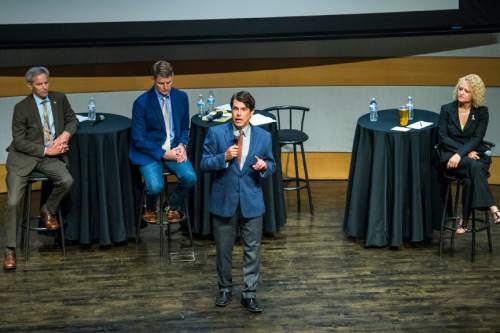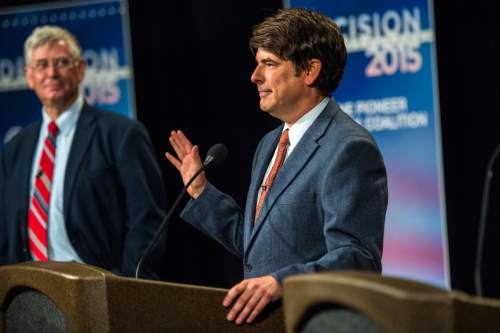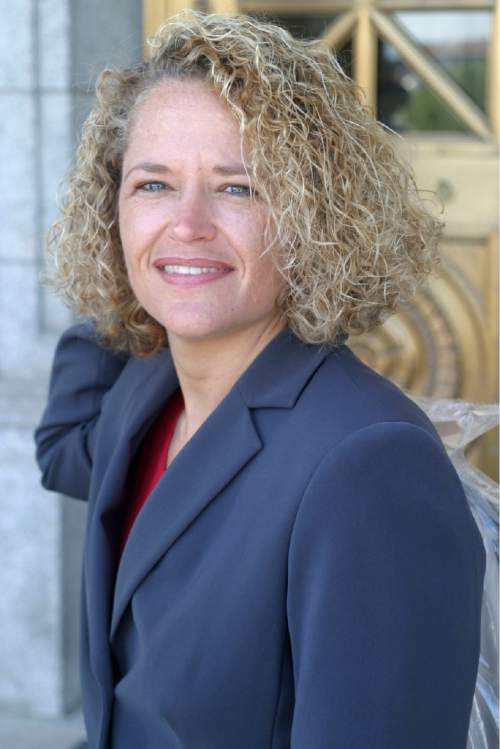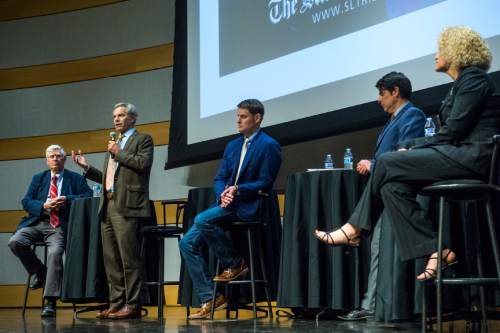This is an archived article that was published on sltrib.com in 2015, and information in the article may be outdated. It is provided only for personal research purposes and may not be reprinted.
Candidates for Salt Lake City mayor have been knocking on doors, making media appearances, debating and dialing for dollars for months. After Tuesday's primary election, two will remain to face off in the Nov. 3 general election.
Here is one last look at Mayor Ralph Becker, former state legislator Jackie Biskupski, community activist George Chapman, City Council Chairman Luke Garrott and businessman Dave Robinson before polls close.
Vote by mail has been ongoing since mid-July with about 24 percent of registered Salt Lake City voters already casting ballots.
For those who have not yet cast ballots, The Salt Lake Tribune has highlighted some of the candidates' key statements and positions.
—
Ralph Becker • The two-term Salt Lake City mayor is running for a third term — something rare historically among the capital's leaders.
Becker, 63, a former state legislator and business owner, is campaigning on a record that he said shows leadership, particularly in steering the city through economic storms into better times, evidenced by a building boom and growth in revenue from sales and property tax.
The hallmarks of the Becker administration include a new high-tech Public Safety Building, a new streetcar in Sugar House, solar-powered parking meters downtown that accept credit cards, a new mega-theater going up on Main Street and a protected bicycle lane on 300 South from 600 East to 300 West.
The mayor also points to the expansion of the financial firm of Goldman Sachs and residential construction downtown and in Sugar House.
He touts his record of not proposing property tax increases, although the City Council did hike them in 2013 to maintain streets, parks, storm sewers and other facilities. Becker this year is pushing a property tax increase for open space and trails.
The mayor freely acknowledges raising user fees during his tenure, a mechanism he said was fairer than property tax increases and allowed him to balance the budget in lean times.
ON THE ISSUES
Recreation bond • The mayor strongly favors a $150 million recreation bond his administration outlined at the request of the City Council. The plan, he said, would bring the city into a new and unique realm with added open space, trails and outdoor recreation amenities.
Transportation • Becker favors more streetcars and more protected bicycle lanes. He also reinforced his "complete streets" philosophy to make roadways usable by autos, bikes and pedestrians. Reducing auto lanes along 1300 East is an example.
Economy • The mayor said the city is doing well but could do better by attracting more high-tech companies.
Homelessness • Becker convened a commission of community leaders to evaluate facilities of homeless-services providers that will determine, among other things, whether The Road Home shelter should be moved or rebuilt in place.
Police • At first reluctant to add officers to the police department, the mayor has now embraced the idea and has boosted patrol officers. Under interim Police Chief Mike Brown, the department will return to beat patrolling and will add bicycle cops.
Burbank • The mayor said he dismissed the former police chief after it became apparent that he was not fulfilling his pledge to improve programming aimed at reducing sexual harassment. The forced resignation came a year after former Deputy Chief Rick Findlay was allowed to retire with full benefits after sexual-harassment allegations by three women officers were confirmed.
—
Jackie Biskupski • She made history as the first openly gay member of the Utah House, where she served from 1999 to 2011.
For the past eight years, she has been a top administrator for Salt Lake County Sheriff Jim Winder.
Among the pillars of Biskupski's campaign for mayor is what she calls "collaborative" leadership. She faults the incumbent mayor for being too insular. For example, she said the city does not have a strong relationship with the Governor's Office of Economic Development.
"Collaboration will help us move forward," she said of engaging the public and private sectors. "I have the ability to bring people to the table."
Biskupski, 39, said it's important for a mayor to listen to constituents.
"It's great that we're getting this big, new theater," she said of the Eccles Theater going up on Main Street. "But it's unfortunate the voters didn't get a say [in the $119 million project]."
Although the city is undergoing a high-density housing building boom downtown and in Sugar House, Biskupski said many residents cannot afford them. She would emphasize affordable housing of all types.
ON THE ISSUES
Recreation bond • Biskupski is against the $150 million recreation bond proposed by Becker that is being modified by the City Council. She said it's too much and hasn't had enough study. She also is against closing the Glendale Golf Course.
Transportation • Unlike Becker, Biskupski does not favor more streetcar lines until a transit master plan is created. She argues the city should consider creating a bus system that would complement the Utah Transit Authority's bus lines, which have shrunk in recent years.
Economy • Economic growth is not keeping pace with the costs of running the city, she said. "If we had a diverse, strong economy, we would not even be talking about raising taxes." Biskupski's strategy would be to work with the state to attract business.
Homelessness • The candidate said women and children must be separated from the male population at The Road Home, a 1,200-bed shelter. A preferred scenario, she said, would be to house people seeking emergency shelter in smaller facilities (around 250 beds) in various locations.
Police • The police department should "redeploy the large number of officers" in and around Pioneer Park back into other neighborhoods, Biskupski said. Further, the department should develop a strategic law-enforcement plan with the Unified Police Department to concentrate on drug dealers around the homeless shelter.
Burbank • Biskupski said that the mayor should have dealt with former Chief Chris Burbank in the spring of 2014, rather than waiting to act in June. If she had been mayor, Biskupski said, she would have done that and Burbank would still be police chief.
—
George Chapman • The community activist, 64, is a retired engineer and former naval officer who emphasizes protection of neighborhoods from high-density development, streetcars and crime.
Property taxes and user fees in Salt Lake City are too high, said the University of Utah graduate, crediting that to a city government that lacks efficiency.
Plans for three new streetcar lines in the city should be scrapped in favor of more bus routes that would serve neighborhoods. Chapman said that would save taxpayers tens of millions of dollars.
"The voters of Salt Lake City will not be given a chance," Chapman said, "to vote on the bonds and tax increases that these rail projects will require."
He also opposes new city zoning that allows tall buildings to abut single-family neighborhoods.
Chapman has argued against closing golf courses — the city has shut down one and has plans to close two more.
He said that the city's "traffic-calming" and "complete streets" philosophies actually increase air pollution because rush-hour traffic congestion keeps commuters on the roads longer.
ON THE ISSUES
Recreation bond • Chapman said he does not favor the proposed general-obligation bond that would add $60 per year in property tax on a residential unit valued at $250,000. He added that it doesn't make sense to spend $67 million of that transforming Glendale Golf Course into a regional park.
Not least, Chapman said, he would not ignore the city's west side. "All residents will get my respect."
Transportation • The city needs more bus routes in neighborhoods with efficient connections to downtown, Chapman said. He also would not reduce automobile lanes on major thoroughfares, but would create safer bike lanes.
Economy • Chapman said city leaders should do everything they can to attract high-tech businesses. The city's economic-development program must work more closely with the U., which is proving itself to be the state's best job generator.
Homelessness • It doesn't take rocket science to fix the problems that accompany homelessness downtown, the candidate said. The homeless need a new campus on the Rio Grande Street site, a 24-hour storage facility and more security.
Police • Chapman wants at least 50 new police officers. That would cut response times in neighborhoods, he said, and reduce crime and drug trafficking downtown.
Burbank • The former chief's ouster was nothing short of political calculus, Chapman said. If the mayor disagreed with Burbank's handling of sexual-harassment allegations against Deputy Chief Rick Findlay, the mayor should have taken action a year before he did.
—
Luke Garrott • The City Council chairman, 47, is a political-science professor coming to the end of his second four-year term on the council.
He has been an influential voice on the body, which sets policies and annual budgets. Garrott has emphasized affordable housing, development of walkable neighborhoods and transportation alternatives to the automobile.
Once a big fan of streetcars, Garrott said he is disappointed with the Sugar House Streetcar. "It's not a real streetcar; it operates on an abandoned rail line," he said. Nonetheless, a streetcar done right could be a development tool in the Granary District — the area around 900 South and 400 West — and act as a connector from the 400 South TRAX line to the TRAX Central Station.
Garrott was among the council members in 2013 to vote to raise property taxes to fix crumbling roads and sidewalks, as well as preen parks that had become shabby since the economic downturn in 2008.
New development should be fostered, he said, but not at the expense of older neighborhoods that should be protected.
He is critical of spending on expensive projects, such as the Eccles Theater — that he said will serve only a small portion of the community.
ON THE ISSUES
Recreation bond • Garrott was against Becker's proposed $150 million recreation bond. But with some proposed adjustments, including $50 million for needed capital improvements on existing or already-approved projects, he now favors the bond. The total would remain at $150 million.
Transportation • Garrott has said that the city should develop its own bus system to augment that of the Utah Transit Authority, which has cut bus routes in recent years. He also wants UTA to increase its bus lines and hours of operation.
Economy • More emphasis should be placed on homegrown small business, Garrott said. Lease rates are a problem for small companies. The city must ensure those businesses are not priced out of town.
Homelessness • The homeless population should be less concentrated than the present configuration at The Road Home shelter, Garrott said. Small shelters should be found around the city. He also favors a rapid re-housing program supported by vouchers that would work together with a jobs program.
Police • The council chairman said he wants more cops and he wants them out of their cars on foot and on bicycles throughout the city. It is important, he said, that they make themselves visible.
Burbank • The political timing and calculation of the police chief's forced resignation was "unfortunate," Garrott said. Nonetheless, he said, he had no sympathy for Burbank because the chief should have fired Deputy Chief Rick Findlay after sexual-harassment allegations were confirmed in January 2014.
—
Dave Robinson • The businessman, 47, has varied interests from development to the outdoors, including horses. His candidacy is his first foray into electoral politics.
Robinson, who has been a consultant on watershed issues for private-property owners in Big Cottonwood and Little Cottonwood canyons, has faulted the Becker administration for suing landowners rather than using that money to buy watershed.
City neighborhoods need protecting from high-density projects, he said. But city ordinances and codes are often confusing. Zoning needs to be revisited so that compatible new construction can be possible in older areas.
"We've got to find a balance of affordable housing throughout the city," Robinson said.
One option that should be explored further, he said, is for local government to promote ownership of rental apartments that could be transformed into condominium lofts.
And not least, City Hall should be listening more closely to community councils.
ON THE ISSUES
Recreation bond • Robinson is not ready to support the proposed $150 million bond, he said, because it begs more community discussion. "It has been rushed." He added that there needs to be more analysis of how the city's golf system could boost revenues before closing Glendale Golf Course.
Transportation • A proposed quarter-cent sales tax on the November ballot that is dedicated to transportation would help increase mass transit, Robinson said. In addition, he said, the city could pay UTA to create new bus routes.
Economy • Many high-tech companies are locating in Utah County when their employees would rather live in Salt Lake City because of its lifestyle, Robinson said. That points up that the city is not doing enough to get them here.
Homelessness • Women and children should be housed in separate shelters. Just as important is what Robinson called "an individualized approach," in which social workers would consider each person's circumstances "to keep people from falling through the cracks."
Police • The city has a problem with burglaries in neighborhoods, and residents are experiencing long response times from police, Robinson said. He doesn't believe there are enough officers. He would add social workers to aid the homeless, and reassign police from downtown to other areas.
Burbank • The former police chief's ouster was a political move, Robinson said. He believes Burbank handled the sexual-harassment allegation correctly in the Rick Findlay case and wonders why the mayor didn't have more discussion with Burbank on the issue.









